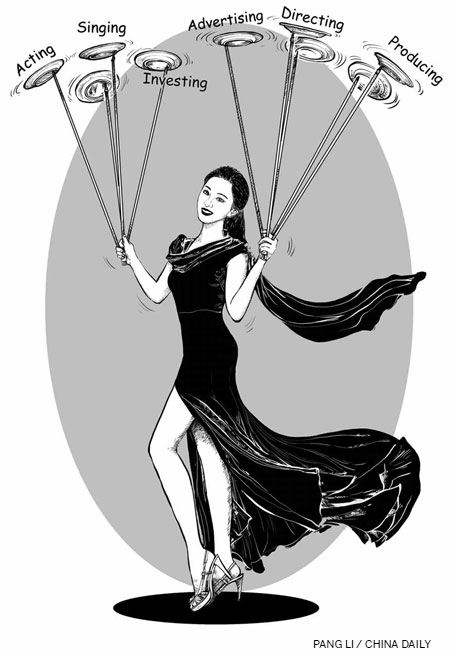Star power
Updated: 2013-03-11 15:31
By Raymond Zhou (China Daily)
|
|||||||||||

Chinese movie stars have demonstrated their entrepreneurial spirit by operating their independent or affiliated workshops and going beyond a simple star turn in front of the camera.
While the debate rages on whether a movie project should be director-oriented or producer-oriented, Chinese stars are becoming more dexterous in handling both sides of the camera. Some, like Xu Zheng, have taken on the role of the director, with great success, and more are appearing in the credits of the lower-profile but no less crucial producer.
|
|
| Nibbling away at food waste |
|
|
| Standing debate |
|
|
| Setting the scene for success |
It may not be an exaggeration that China's movie and television industries - its scripted entertainment - look poised to be star-driven. One sign of the power shift is the mushrooming of so-called "star workshops".
In the old days, a star performer, no matter how big, must be an employee of a State-owned studio or theater company. Just as in Hollywood's studio era, movie stars were assigned roles and were occasionally loaned to other studios. Nowadays, unbeknownst to the public, many of them still belong to State-owned entities, but only nominally. Ge You is still counted as a member of a performing troupe affiliated with the National Trade Union, and he fulfilled his duty by headlining a stage comedy, which, mainly due to his star wattage, played to sold-out houses in a countrywide tour.
Normally, they pay a token "management" fee to the company in exchange for the standard package of benefits, which is negligible to them, plus the sense of security of being part of something backed by the State.
In the past two decades, talent agencies have sprung up in China, often as a subsidiary of a large production or distribution company. Standalone agencies such as the Chinese branch of CAA have not fared well because their most valuable service -putting together various resources into a package - is not in demand in China. Chinese movie studios would not go out and buy such a package. There are only a limited number of studios and they control more resources than agencies. People want to be closer to the power center rather than going through a third party that cannot make the crucial decisions.
The same dynamic now applies to the stars and their affiliated studios, mostly privately owned and representing the most energetic of the business. As fame and power accrue to stars, they demand more creative and management control over their projects. They do not want to be treated the way they are in a State-owned studio. A few years ago, some of them began to establish workshops that allow them to operate with more independence.
For more coverage by Raymond Zhou, click here
Related Stories
Disney working on standalone Star Wars movies 2013-03-07 10:16
Star Tracks in March 2013-03-04 16:00
Gala role returns Zhao to the spotlight 2013-03-01 13:10
Arts exam 2013: Reaching for the stars 2013-02-27 11:11
Laowai ready to get into the act, too 2013-02-27 09:14
For many, the pursuit of acting is a family affair 2013-02-27 09:05
Today's Top News
Police continue manhunt for 2nd bombing suspect
H7N9 flu transmission studied
8% growth predicted for Q2
Nuke reactor gets foreign contract
First couple on Time's list of most influential
'Green' awareness levels drop in Beijing
Palace Museum spruces up
Trading channels 'need to broaden'
Hot Topics
Lunar probe , China growth forecasts, Emission rules get tougher, China seen through 'colored lens', International board,
Editor's Picks

|

|

|

|

|

|








